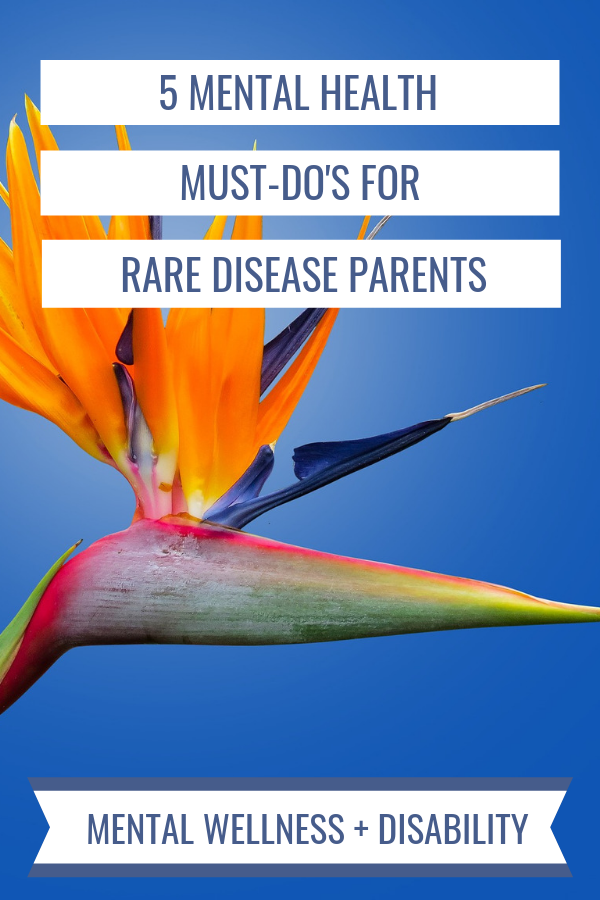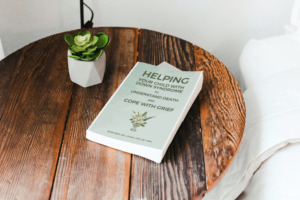I often meet for counseling with parents raising kids with rare diseases.
Here are some quick facts about rare diseases
- In the US, a disease or disorder is considered rare when it affects fewer than 200,000 Americans at any given time.
- 80% of rare diseases are genetic. The rest may be due to infections, environmental causes or allergies, or be degenerative in nature.
- 50% of rare diseases affect children.
- There are over 6000 recognized rare diseases.
You can visit rarediseaseday.org for more info.
Despite this staggering number of identified different disorders that may affect a child, I find that the experiences of parents raising kids with rare diseases are often similar.
If you are raising a child with a rare disease, some of these feelings may resonate with you.
You feel isolated, afraid about the future, and unsure of what’s truly best for your child.
You exhaust yourself by trying to read every article and attend every conference. But at the same time, you constantly feeling like you’re not doing enough to help your child.
You feel angry, sad, and defeated when others jump to conclusions about your child because of the way they look or how they behave.
Living in a world that doesn’t appreciate your kiddo’s resilience and joy is maybe the hardest part of the journey.

Here are 5 things that I recommend you do for your mental health if your child has a rare disease
1. When it comes to support, connect with emotion, not diagnosis
I often see articles reminding rare disease parents that it’s OK to look to others for support.
As a therapist, I disagree.
It’s not OK for you to look to others for support.
It’s essential, critical, and necessary that you look to others for support.
What trips up many rare disease parents is where to find that support.
“My child is the only one in the world who has this condition” is a phrase that I hear often in my office.
Or, parents will describe something like this:
“There are only 12 people in the world who have this disorder, and most of them live in Eastern Europe. Even if we wanted to create an online support group, there would be a language barrier for me.”
These scenarios can leave you feeling isolated and weary of what’s right for your child.
This is why I suggest that rare disease parents not focus on their child’s diagnosis when building a support team for themselves.
Imagine a mother whose child was born without eyes (Anophthalmia). She may connect with a parent whose child has Stargardt disease about the struggles of supporting a child who has no vision.
Or, she may find support from a parent whose child has neurofibromatosis. They can lean on each other when kids on the playground say mean things because how their child looks. Or when parents say mean things, because of course you know that that’s how it is sometimes.
Because the truth is, any parent raising a child who is somehow different will be able to connect with you. Your struggle is the same in many ways. You are raising a child that the world doesn’t understand, accept, or seem to want.
As a therapist, I am honored that my clients share with me their guilt, and their fears, and their sadness on this journey. I am privileged that they let me be with them for a time while they find better ways to cope and develop confidence in their parenting.
But I know the deep, deep loneliness that many of them feel, and that’s the part that’s heartbreaking.
I encourage parents to muster the strength to share how they’re hurting with other parents. Even if their kids don’t have the same diagnosis. I know they will receive understanding and acceptance in return.
Because you are walking the same path, even if the sign on the trail that led you there had a different name.
2. Recognize and respond to compassion fatigue
When you watch someone you love experience trauma, you can develop compassion fatigue. Unlike burnout, which is just growing weary of care-giving, compassion fatigue is a vicarious trauma experience.
Since the 1990’s, professional caregivers like nurses and therapists have understood compassion fatigue as an occupational hazard. More recently, researchers are recognizing that family caregivers may be as likely to develop compassion fatigue.
I have yet to see any articles that describe compassion fatigue in rare disease parents. But, from what I see in my clinical practice, I believe that rare disease parents are prone to compassion fatigue.
It is devastating when people stare at, bully, and misjudge your child because of how they look or behave. It’s crushing to allow your child the dignity of struggle, to watch them push themselves to do something that’s hard, only to have a teacher or support worker swoop in to do it for them. These are the little moments that, over time, can lead to compassion fatigue.
If untreated, compassion fatigue can have serious effects. Despite loving their child very much, a parent may feel:
- helpless
- hopeless
- ineffective
- angry
- unable to feel empathy
- a sense of isolation
Unlike burnout, which can develop relatively quickly, compassion fatigue is a slow burn. It develops over months and years, and then suddenly feels like a weight you can never escape from.
It makes sense then, that resolving compassion fatigue can’t happen overnight. Or at a weekend retreat.
It requires an ongoing commitment to recognizing and responding to signs of this unique exhaustion in yourself.
I like to suggest that the rare disease parents I support in counseling develop a personal 1-10 scale. Then they can check in with themselves daily.
Here’s how it usually sounds:
“Today I noticed that I’ve made frozen dinners the last 3 nights, even though I enjoy cooking from scratch. I’d say that puts me at a 3. I’m going to commit to not scrolling aimlessly on social media, so that I can avoid hearing more news that upsets me.”
Or
“I haven’t taken a shower in 2 days, and I didn’t take the dog for a walk even though the weather was beautiful. I just stayed in and cried for no reason. I’m feeling bad, maybe around an 8. I’m going to start each morning by drinking a cup of tea, writing in a gratitude journal, and then taking a shower. I’m going to request an extra therapy appointment with my counselor. I’m going to have the kids buy lunch at school instead of packing them a lunch for the rest of the week. Every night, I’m going to look in the mirror and tell myself that however I’m feeling is OK. I’m going to remind myself of all the things I’m doing to take care of me.”
3. Develop scripts
Another great antidote to compassion fatigue for many parents is to develop scripts. As a rare disease parent, you will sometimes feel like you’re on a loop. Giving the same explanations and answering the same questions over and over.
Some days you may feel up for answering people’s questions and sharing your knowledge with them. But on days when that feels like too much, it’s great to have a script to rely on. It can be as simple as:
“Jessie is a kid who loves Chinese food, dancing to Taylor Swift songs, and making friendship bracelets. Because of her Chromosome 18 deletion, she has some trouble with her vision and hearing. It helps to make sure you have her attention and that she’s looking at you before you speak. And of course, like any kid, she sometimes hates wearing her glasses, but we just remind her that it’s easier for her when she keeps them on.”
As I hope this highlights, scripts are a powerful tool in shaping others’ view of your child.
This script invites the listener to get to know your child outside of their condition. It reminds the listener that your child is child like any other, one who wants to laugh, play, and most importantly, feel accepted for exactly who they are.
Keep in mind too that your child is listening. Whether or not they communicate verbally, how they hear you talk about them will influence their self-concept. Teach your child to see themselves as a whole, unique, and wonderful person, not as someone who is defined and limited by their genes.
You can read this post for more detail about how to develop scripts specifically for those times when someone says mean things about your child. There’s even a printable template you can download with some responses to especially negative questions. For those times when you want to say something, but you feel too shocked to speak.
4. Avoid fear-based parenting
I recently met with a father, let’s call him Jack, whose child had a rare disease. There are around 15 other people known to have this disorder worldwide. Nearly all of them have been written up by physicians as case studies in medical journals.
In every case study Jack read, the child who shared his child’s diagnosis had seizures.
But Jack’s son didn’t.
Jack realized that he’d held his child, who was in his mid-20’s, back from doing many things that he wanted to do, simply because of the risk of seizures.
Jack’s child had never gone to video-game arcades or the state fair. Jack feared the flashing lights would cause seizures.
He’d never learned to drive, even though he was physically and intellectually capable of doing so. Jack so feared that his child might have a seizure while driving that he wouldn’t allow him to learn.
Jack sheltered his child from having a dating life or going on roller-coasters. Many other activities that might cause excitement were off limits.
Ultimately, Jack realized that his parenting decisions were all based in fear. He saw that his worry and the limitations he was putting on his son were interest he was paying on a debt that he might never owe.
Over time, Jack learned to find balance in the ‘what if’s’.
For every time he said “What if my son is driving and has a seizure?”, he countered by asking himself a positive what if.
“What if he is physically healthy, as he has always been, and has a wonderful time with his peers?”
5. Re-calibrate your view of yourself to include, but not be defined by, raising a child with a rare disease
Having a child with a rare disease can make parents question the value of their life before their child was in it.
Many parents feel guilt and shame for how they viewed people with disabilities before becoming a parent to one. They feel inspired by their child’s resilience, and they of course feel the palpable lack of supports for other parents like them.
This can lead parents to:
- form support groups
- work as professional advocates
- start foundations
- lobby lawmakers
- plan conferences
- write detailed blogs
I do not want to imply that doing any of those things is inherently wrong. It certainly isn’t.
But, I have talked with many parents who, after a few years of devoting themselves to their child’s condition, realize that they have lost themselves.
They start to question who they are outside of being a parent raising a kid with a rare disorder.
I encourage parents who feel this way to intentionally restore balance to their lives.
One strategy that some parents use to do this is color code their calendar or day planner.
All activities related to parenting and caring for their child might be blue. Those related to their child’s condition, but not directly to their child’s care, could be orange. Lastly, green activities are those that are only for them.
I invite parents to map out their upcoming week in detail. I remind them to include tasks that they might not normally include on a day planner. Tasks like supervising their child’s bath time, or spending time researching a blog post.
Then, we sit back and look at the week by color. This exercise often highlights for many parents why they feel they are spending disproportionate time learning and talking about their child’s disorder. When their time is color coded, it’s easy to see that they aren’t spending enough of it caring for themselves.
Summary
Parenting a child with a rare disease is challenging. But, as many parents know, the challenges usually have little to do with your child’s condition. What’s really hard is raising them in a world that just doesn’t see how awesome they are.
It can also be a struggle to manage the emotional journal of raising a child with a rare disease. If this blog post offered you ways to accept and cope with some of those tough feelings, I hope that you will use the social share buttons to invite others to read this.












